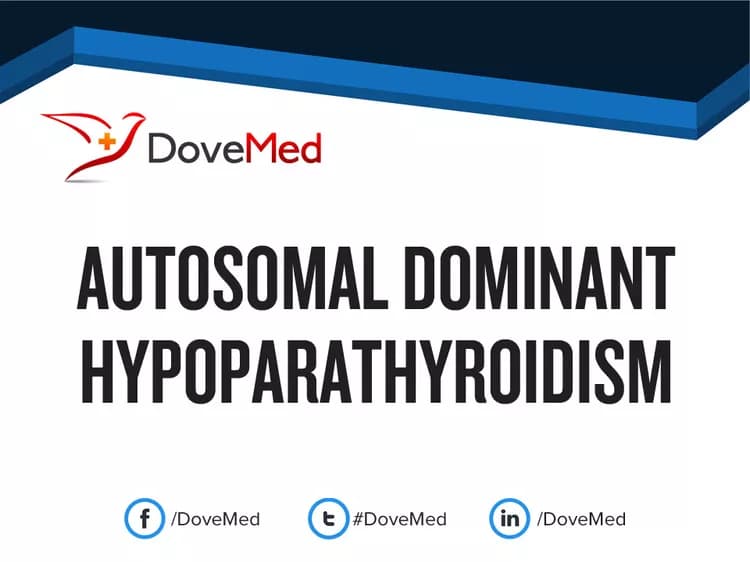The topic Autosomal Dominant Hypoparathyroidism you are seeking is a synonym, or alternative name, or is closely related to the medical condition Autosomal Dominant Hypocalcemia.
Quick Summary:
- Autosomal Dominant Hypocalcemia (ADH) is a genetic disorder that is inherited in an autosomal dominant manner, where one defective copy of either affected gene can cause the disorder if present in all the cells. A family history of the condition is the single major risk factor for developing ADH
- Under normal circumstances, two proteins (CaSR and Gα11) coded by the CASR and GNA11 genes, work together towards calcium homeostasis (equilibrium). CaSR binds calcium and signals to Gα11 to block the release of calcium in the bloodstream, when calcium levels are too high
- However, if either the CaSR or Gα11 genes are mutated, calcium metabolism is affected, which can cause Autosomal Dominant Hypocalcemia. There are two types of ADH:
- Type 1 Autosomal Dominant Hypocalcemia
- Type 2 Autosomal Dominant Hypocalcemia
- The majority of individuals with Autosomal Dominant Hypocalcemia have Type 1 ADH, where the CASR gene is mutated and the CaSR protein is abnormal. This abnormal protein is hyper-sensitive to calcium and sends a signal to Gα11 to block the release of calcium in blood, which can cause the characteristic symptoms of Autosomal Dominant Hypocalcemia
- Mutations in the GNA11 gene, which codes for the Gα11 protein, leads to Type 2 Autosomal Dominant Hypocalcemia. The abnormal Gα11 blocks the release of calcium in the bloodstream, which can lead to a drop in blood calcium levels
- Individuals with Autosomal Dominant Hypocalcemia may be asymptomatic, or may have mild, moderate, or severe symptoms. These symptoms can include abnormal weakness, movement disorders, abnormal sensations, seizures, and the release of excess calcium through urine. Additionally, ADH may also interfere with the balance of other molecules such as phosphates and magnesium
- Since calcium can crystallize within the kidneys, the crystals can form stones and interfere with kidney function. This can cause renal failure, a potential complication of ADH
- The diagnosis of Autosomal Dominant Hypocalcemia can be made accidentally during a routine examination in asymptomatic individuals. In those with ADH symptoms, a physical examination, assessment of family medical history, symptom evaluation, blood and urine tests, and ultrasound imaging studies may be required for diagnosis
- Some of the treatment options for Autosomal Dominant Hypocalcemia include oral or intravenous calcium supplementation, vitamin-D supplements, and parathyroid hormone infusion
- The prognosis of Autosomal Dominant Hypocalcemia is dictated by the type and severity of the symptoms. Delayed or inadequate treatment may lead to kidney failure
Please find comprehensive information on Autosomal Dominant Hypocalcemia regarding definition, distribution, risk factors, causes, signs & symptoms, diagnosis, complications, treatment, prevention, prognosis, and additional useful information HERE.
Related Articles
Test Your Knowledge
Asked by users
Related Centers
Related Specialties
Related Physicians
Related Procedures
Related Resources
Join DoveHubs
and connect with fellow professionals


0 Comments
Please log in to post a comment.